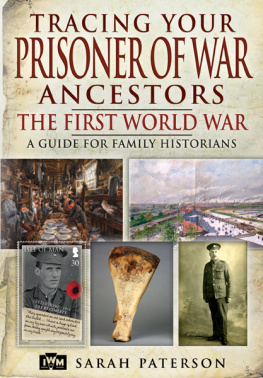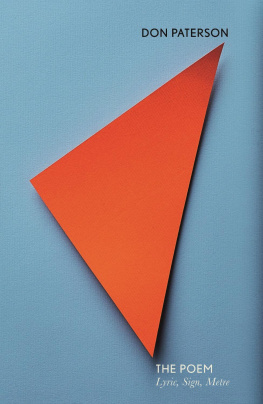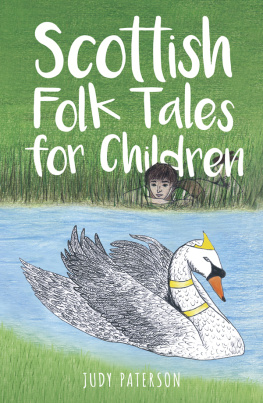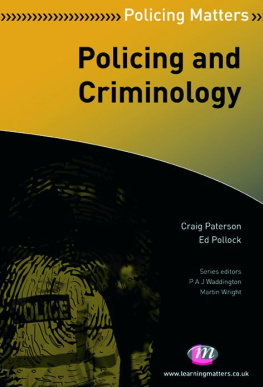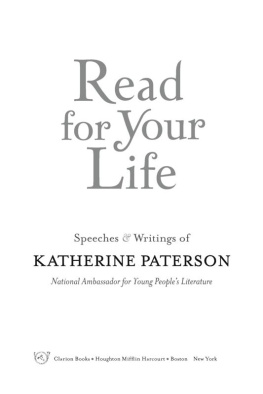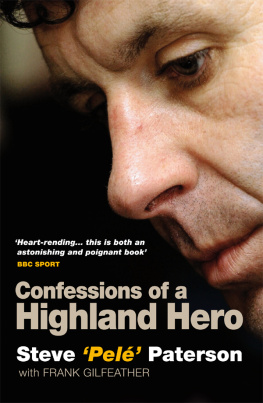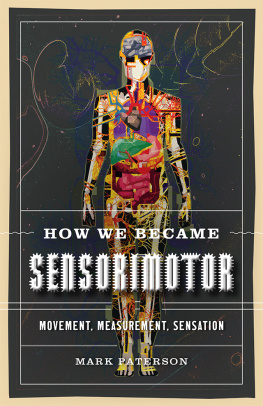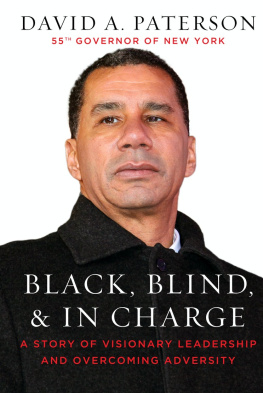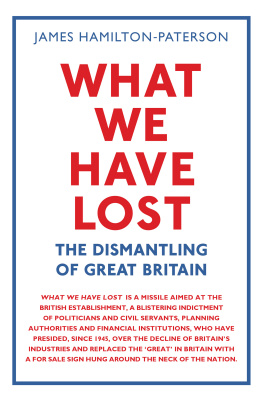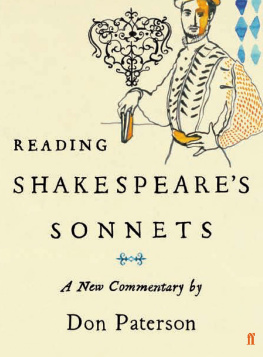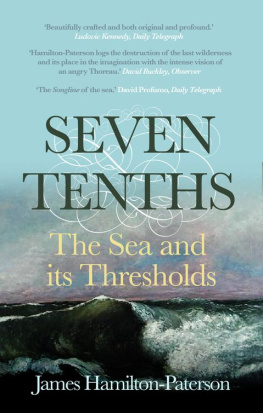BEST
THOUGHT,
WORST
THOUGHT
On Art, Sex, Work, and Death
Aphorisms
Don Paterson
Graywolf Press Saint Paul, Minnesota
Copyright 2008 by Don Paterson
Publication of this volume is made possible in part by a grant provided by the Minnesota State Arts Board, through an appropriation by the Minnesota State Legislature; a grant from the Wells Fargo Foundation Minnesota; and a grant from the National Endowment for the Arts, which believes that a great nation deserves great art. Significant support has also been provided by the Bush Foundation; Target; the McKnight Foundation; and other generous contributions from foundations, corporations, and individuals. To these organizations and individuals we offer our heartfelt thanks.

NATIONAL ENDOWMENT FOR THE ARTS
M INNESOTA S TATE A RTS B OARD
Aphorisms in Best Thought , Worst Thought were originally published in The Book of Shadows (Picador, 2004) and The Blind Eye: A Book of Late Advice (Faber and Faber, 2007), both published in the United Kingdom.
Published by Graywolf Press 2402 University Avenue, Suite Saint Paul, Minnesota 55114 All rights reserved.
www.graywolfpress.org
Published in the United States of America
ISBN 978-1-55597-505-0
246897531
First Graywolf Printing, 2008
Library of Congress Control Number: 2007940217
Cover design: Kyle G. Hunter
Other Books by Don Paterson
Poetry
Orpheus Landing Light
The White Lie: New and Selected Poetry
The Eyes
God's Gift to Women
Nil Nil
Aphorism
The Blind Eye The Book of Shadows
Editor
New British Poetry (with Charles Simic) Don't Ask Me What I Mean:
Poets in Their Own Words (with Clare Brown) Last Words (with Jo Shapcott) Robert Burns: Selected Poems101Sonnets: From Shakespeare to Heaney
for Nora
Foreword
On the morning the Barbarians wandered through the gates, everyone in Rome had their feet up and was reading a foreword.
The aphorism is a brief waste of time. The poem is a complete waste of time. The novel is a monumental waste of time.
The aphorism: too much too soon or too little too late, but never just enough for the time being.
Yes I know Marcus Aurelius or Vauvenargues or Chesterton has already said this, and far more elegantly; but let's face it, you weren't listening then either.
The aphorism will often contain one italicized word; this denotes its magnetic North, not its direction.
Key: read I for he; R. for S.; no one for you; it for I.
The shorter the form, the greater our expectation of its significanceand the greater its capacity for disappointing us. A book of aphorisms is a lexicon of disappointments. The forms only virtue is its brevity; at least the reader cannot seriously hold that it has wasted their time.
The aphorism is nobody speaking to nobody; it's less read than eavesdropped upon. God knows, its barely even written:
I disown them immediately.
Despite our attempts to imbue them with some flavor, any flavoraphorisms all turn out so... generic; they all sound as if they were delivered by the same disenfranchised, bad- tempered minor deity.
The aphorism is the rational articulation of a fleeting hysteria.
S. has written a comprehensive book of aphorisms. He has made a vast list of subjects, then sat down and composed his brilliancy on each of themeven those on which he had no opinion, until that very moment.
How many aphorists does it take to change a lightbulb? How many aphorists does it take to change a lightbulb? ... And so on with our little antipoetry, our ear to the strongbox of the line while we work the combinations, trying the italics on one word, then the next, until we hear something weaken inside...
A book of aphorisms makes no pretense to engage the reader in any sort of dialogue; to judge by its tone of relent less asseveration, it has no opinion of them. What the reader feels is a kind of ultimate contempt, that of ink for the human, the mineral for the animal.
Z. has numbered his aphorisms. Now he has added a cumulative disappointment.
Poetic truth occurs at that point in the steady refinement of a form of words where they cease to be paraphrasable, but have not yet become purely oracular. Also, perhaps, a definition of the aphorism, its talentless, tone-deaf brother.
Allowed myself a smile this morning at a letter innocently referring to 'my love of the aphoristic form.' Heavensdo you think if I really had a choice, I would write this? We occupy the margins through fate, not allegiance.
The difference between the aphorism and the poem is that the aphorism states its conclusion first. It is a form without tension, and therefore simultaneously perfect and perfectly dispensable. There is no road, no tale, no desire.
Here is a very bad aphorism for the purpose of illustrative quotation.
Tried to rewrite this book as less self-important; gave up, realizing that was its only virtue.
Reading a book of aphorisms diligently in the sequence they appear makes about as much sense as eating a large jar of onions diligently in the sequence they appear; and no one should try to finish either in one sitting.
Notes on a few aphorists:
Canetti: he did not really understand the aphoristic form. In an intelligence like his, this should tell us something of the... obscurity of the skill. "Rarity" might imply it had a value.
Chesterton: the only really great aphorist in English. Halifax is okay, but all the restHazlitt and (curiously) Wilde excepted are wits. The Anglophone embarrassment in regards to the unilateral assertionwhich it cannot help thinking of as a subset of "wisdom literature"began very early. This it sees as the sole preserve of the holy books; all other attempts at it are laughed away uncomfortably, on the grounds, ultimately, of their seedy human provenance. You would think such a culturally ingrained self-hatred would make the English ideal aphorists. However you can be over- qualified for the task.
Cocteau: he would have been the greatest, but he was far too happy. The dominant harmony and black dissonance supplied by heterosexual self-loathing are the only things I really miss in Barthes, too.
Heraclitus: to read him for the first time is like digging a hundred knives from the ground, nearly all of them still gleaming.
Kraus: too much spleen over sense, and Marx's fatal attraction for rhetorical chiasmus, which is always fake; only forms can be placed in such symmetries, never concepts. And to have affected Schopenhauer's and Nietzsche's misogyny, of all their attributesand this in a genuine lover of women.
Jabs: a great writer, but as an aphorist a queer cocktail of rabbinical proverbialism, French blur, and poetic overstatement. Contrary to popular belief, there is nothing self-evident about the aphorism at all. Within the form, the axiom and the crazy assertion are the same waste of breath
La Bruyere: a lexicon of human prejudice. Still useful.
La Rochefoucauld: in an old Penguin Classic edition of his work, a superbly bad-tempered back-cover blurb used him to demolish a stupid contemporary critic. Any writer who can be set so easily to his own defense still earns our respect.
Leopardi: I wish we could suppress this adolescent habit of ours of automatically conferring genius upon even the latest of early deaths.
Lichtenberg: German
Next page



